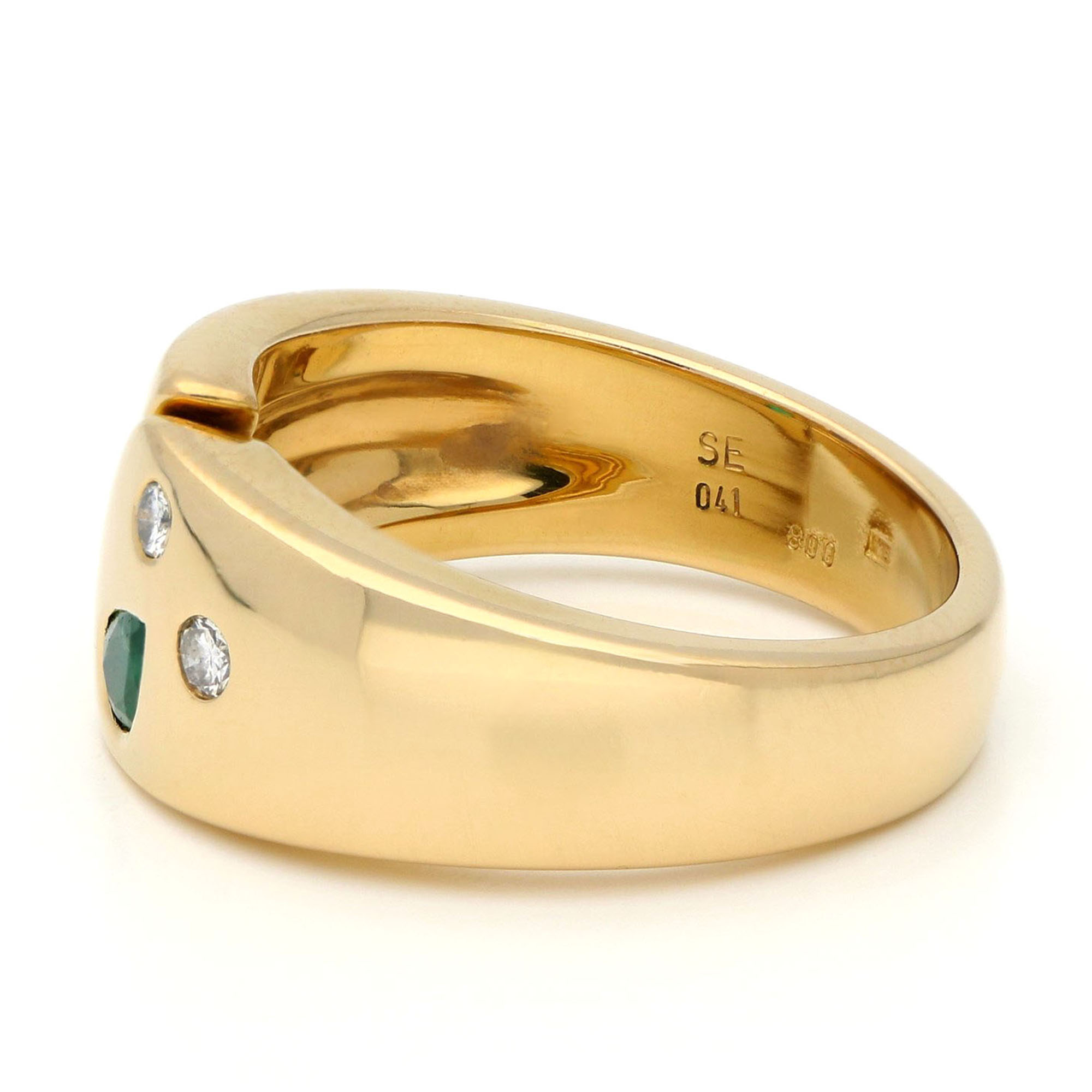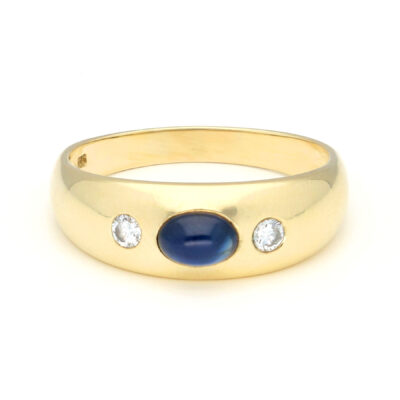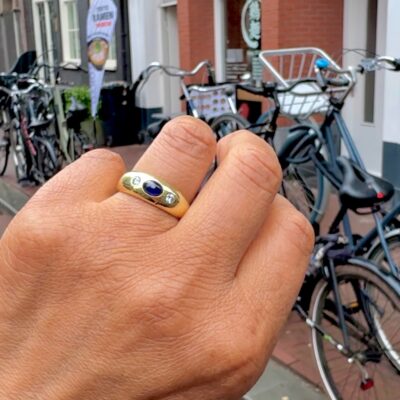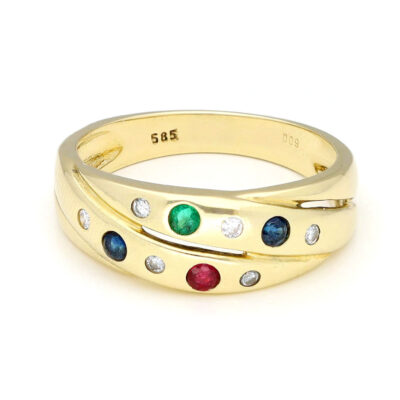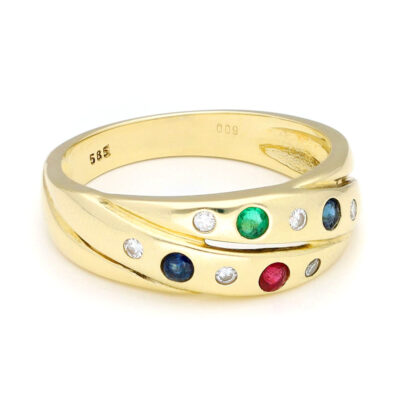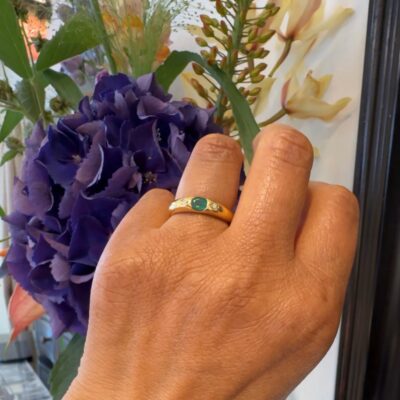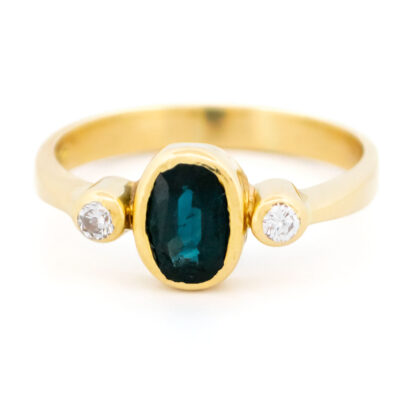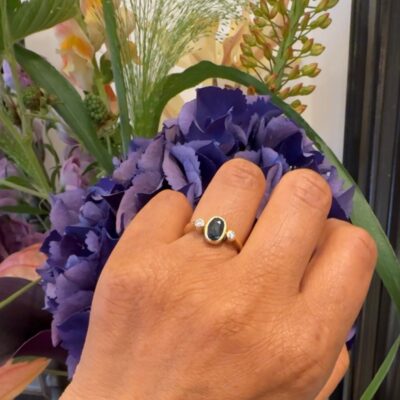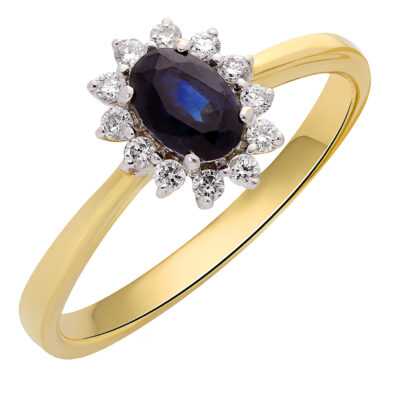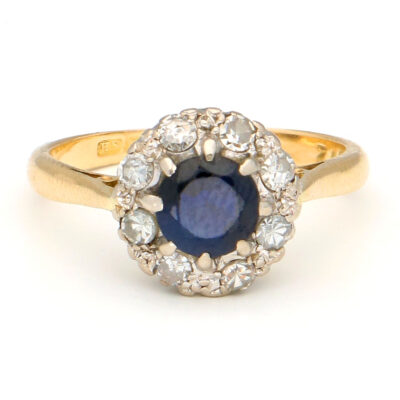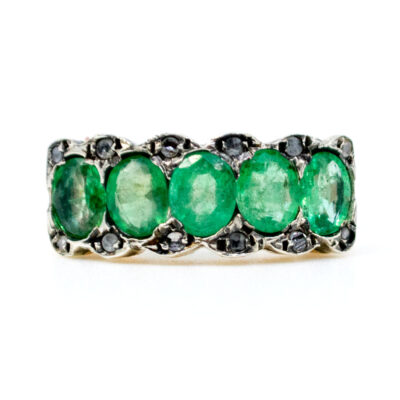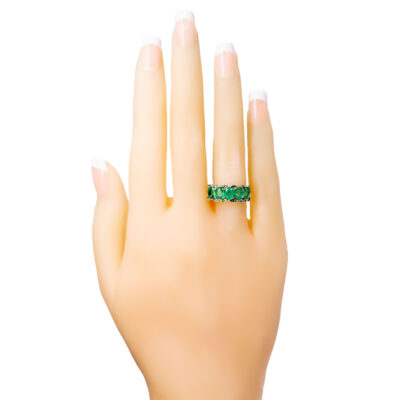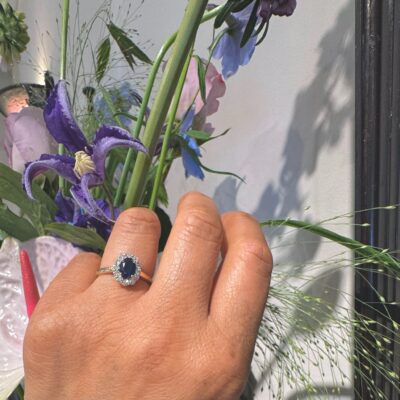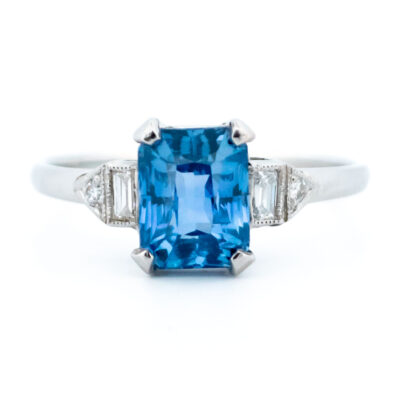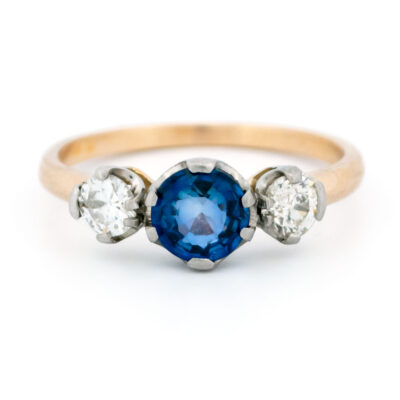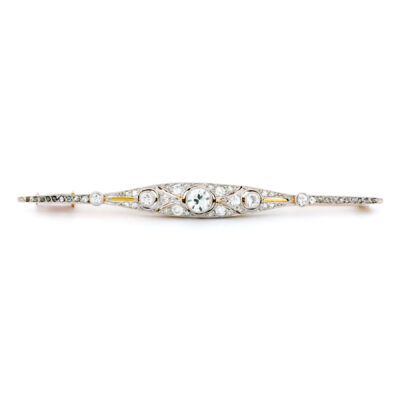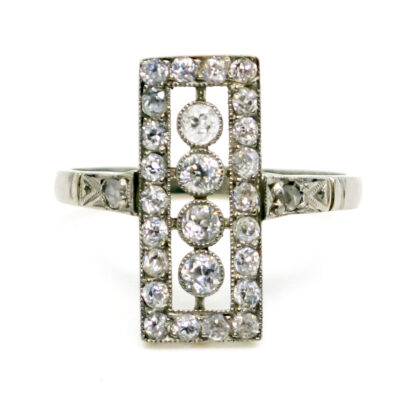This stunning mid-20th century (1950-1970) gypsy ring in yellow gold features a timeless, bold design. It is set with two brilliant-cut diamonds (approx. 0.03 ct total, H/I color, VS2/SI1 clarity), a round faceted sapphire (approx. 0.15 ct), and a pear-cut emerald (approx. 0.15 ct). The unique combination of gemstones adds vibrant color and sophistication to this classic piece.
Videos
Details: ±0.10ct Emerald, ±0.15ct Sapphire, Brilliant-cut diamond, 18k Ring.
Design Era: Mid 20th Century (1950-1970).
Size: 17.53 NL / 55.1 FR / 7¼ US / O UK.
Dimensions: Width of center piece: approx. 10 mm
Sapphire: 1x approx. 3 mm
Emerald: 1x approx. 4.5 x 3 mm.
Weight in grams: 12.5.
Shipping and Pickup: This delicate piece ships from our store located in the center of Amsterdam, The Netherlands. We offer both registered shipping and local pickup at our store. In the case of local pickup, any applicable shipping costs will be refunded.
About Us: Add some sparkle to your style with Binenbaum.com. We offer a stunning selection of antique and vintage jewelry that you won’t find anywhere else. From timeless rings and dazzling necklaces to unique brooches, we have something for every taste and occasion. Visit our website today and treat yourself to a piece of history.
| Design Era | |
|---|---|
| Design & Historical Context | The 1950s were a time of great cultural and technological change, marked by the emergence of rock 'n' roll, the birth of the "Beat" Generation, the launch of Sputnik, and the beginning of the space race. These events, and the knowledge that the world was living in a nuclear age, contributed to the development of an aesthetic known as the "Atomic Age," which was reflected in various aspects of design, including jewelry. |
| Key Materials | |
| Materials & Craftsmanship | Emerald: The Jewel of Renewal and Prosperity Emerald, with its vibrant green hue, is one of the most prized gemstones in the world, belonging to the beryl family. Its captivating color, ranging from deep forest green to bright spring green, is due to the presence of chromium and vanadium during its formation. Emeralds have been cherished throughout history, from ancient Egyptian pharaohs who believed the stone symbolized eternal youth, to Incan and Aztec civilizations that revered it as a holy stone. In the Renaissance period, emeralds were thought to possess the power to predict the future and reveal truth. In modern jewelry, emeralds are admired for their rich color and elegance. Although they are slightly softer than other precious stones, with a Mohs hardness of 7.5 to 8, their beauty and rarity make them a popular choice for rings, necklaces, and earrings. Emeralds often feature characteristic inclusions, known as "jardin," which add to their uniqueness and charm. Emeralds symbolize renewal, growth, and prosperity, making them a timeless and meaningful choice for jewelry that exudes sophistication and natural beauty. Sapphire: The Gem of Wisdom and Royalty Sapphire, known for its stunning deep blue color, is a gemstone that embodies wisdom, loyalty, and nobility. This precious stone is a variety of the mineral corundum, and while blue is the most famous color, sapphires can also be found in a range of hues, including pink, yellow, green, and even colorless. Historically, sapphire has been revered across cultures for its association with the divine and the eternal. In ancient Persia, it was believed that the sky was painted blue by the reflection of sapphire stones. Throughout the ages, sapphire has been favored by royalty and clergy as a symbol of purity, virtue, and divine favor. Perhaps the most famous modern example is the sapphire engagement ring worn by Princess Diana and now by the Duchess of Cambridge. In jewelry, sapphire is celebrated for its beauty and durability, boasting a Mohs hardness of 9, second only to diamond. This makes sapphire an excellent choice for rings, necklaces, and earrings intended for everyday wear. The stone’s intense color and clarity are often highlighted by settings in white gold or platinum, though yellow gold can also enhance its warmth and depth. Sapphire is more than just a gemstone; it is a symbol of wisdom, fidelity, and nobility. Its rich history, combined with its remarkable durability and beauty, makes it a timeless and elegant choice for jewelry that signifies enduring love and commitment. Brilliant-cut diamond: The Pinnacle of Sparkle and Brilliance The brilliant-cut diamond is the most popular and widely recognized diamond cut in the world, renowned for its exceptional sparkle and fire. This cut, perfected over centuries, is designed to maximize the reflection of light, creating the dazzling brilliance that has made it the standard for diamonds in modern jewelry. The brilliant cut features 58 facets—33 on the crown and 25 on the pavilion—carefully arranged to capture and reflect light from every angle. The precision of these facets ensures that light entering the diamond is reflected internally and dispersed into a stunning array of colors, giving the stone its characteristic brilliance. Historically, the brilliant cut evolved from earlier cuts like the Old European and rose cuts, with advancements in diamond cutting technology and understanding of light reflection. This modern cut became widely adopted in the early 20th century and quickly became the preferred choice for engagement rings and other fine jewelry, due to its unmatched sparkle. In modern jewelry, brilliant-cut diamonds are prized for their versatility and unmatched brilliance. They are the go-to choice for engagement rings, earrings, pendants, and virtually any jewelry piece where a classic, sparkling diamond is desired. The round shape and symmetrical design make the brilliant cut ideal for showcasing the inherent beauty of the diamond, regardless of its size. A brilliant-cut diamond is more than just a gemstone; it is a symbol of timeless beauty and perfection. Its unparalleled sparkle and universal appeal make it the quintessential choice for jewelry that celebrates life's most precious moments. 18k: The Perfect Balance of Luxury and Durability 18k gold is a luxurious and highly sought-after material in the world of fine jewelry, known for its rich color, durability, and value. The "18k" refers to the purity of the gold, indicating that it is composed of 75% pure gold and 25% alloyed metals, such as copper, silver, or palladium. This combination provides the perfect balance between the softness of pure gold and the strength needed for creating durable jewelry. Historically, gold has been prized for its beauty and rarity, symbolizing wealth, power, and status across various cultures and civilizations. 18k gold has been a preferred choice in fine jewelry for centuries due to its ideal blend of purity and strength, offering a radiant gold color that is more vibrant than lower karat golds while still being hard enough for everyday wear. In modern jewelry, 18k gold is favored for its versatility and its ability to enhance the appearance of gemstones. It is available in several colors, including yellow, white, and rose gold, depending on the metals used in the alloy. Each color has its unique appeal: Yellow Gold: The classic choice, offering a warm, rich hue that pairs beautifully with a wide range of gemstones and complements all skin tones. White Gold: A sleek, modern option that resembles platinum or silver but with the strength and luxury of gold. It is often rhodium-plated to enhance its reflective surface. Rose Gold: A romantic, pinkish hue that has gained popularity for its vintage charm and contemporary appeal, achieved by alloying gold with copper. 18k gold is commonly used in engagement rings, wedding bands, earrings, necklaces, and bracelets, where its balance of durability and beauty makes it ideal for both intricate designs and simple, elegant pieces. The alloy's added strength ensures that jewelry can withstand daily wear while maintaining its luster and shape. 18k gold is more than just a material; it is a symbol of refined taste and enduring value. Its perfect blend of luxury and practicality makes 18k gold a timeless choice for those who seek the beauty of high-purity gold without sacrificing durability. Whether in classic or modern designs, 18k gold jewelry offers a radiant and lasting expression of elegance and sophistication. |
| Size | |
| Dimensions | Width of center piece: approx. 10 mm |
| Weight (in grams) | 12.5 |
By following these tips, you can enjoy your precious jewelry for many years to come.
Related Products
-
Diamond Sapphire 14k Gypsy Ring 17681-9252
€ 1.695,00 VAT incl. (where applicable) -
Diamond Emerald Ruby Sapphire 14k Swirl Ring 17886-9327
€ 1.295,00 VAT incl. (where applicable) -
Diamond Emerald 18k Gypsy Ring 13865-8248
€ 1.695,00 VAT incl. (where applicable) -
Diamond Sapphire 18k Trilogy Ring 17504-9215
€ 1.695,00 VAT incl. (where applicable) -
Diamond Sapphire 14k Cluster Ring 18368-9490
€ 1.695,00 VAT incl. (where applicable) -
Diamond Sapphire 18k Cluster Ring 18127-9467
€ 1.795,00 VAT incl. (where applicable) -
Diamond Emerald Silver 9k Row Ring 17925-9333
€ 1.395,00 VAT incl. (where applicable) -
Diamond Sapphire 14k Cluster Ring 17965-9362
€ 1.995,00 VAT incl. (where applicable)
- Home
- Collection
- Fine Jewelry
- Silver Jewelry
- Silverware
- Boxes
- Candlesticks
- Salt and pepper shakers
- Miniatures
- Salt cellars
- Spoon Set
- Condiments
- Frames
- Napkin Ring
- Spoon
- Oddities
- Cups
- Vases
- Cutlery
- Serving Spoon And Cake Server
- Candlesticks
- Baskets
- Hanukkiah
- Spice Tower
- Yad
- Tea Set
- Sugar Castor
- Napkin Rings
- Wine Bottle Coaster
- Wine Stopper
- Tea Pot
- Jugs
- Rattles
- Hip Flask
- Miscellaneous
- Rings 💍
- About
- Contact
- No products in the cart.




